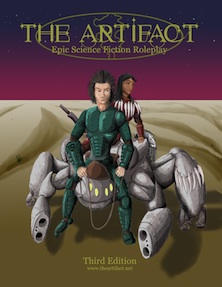There is a proverb of four blind men that meet an elephant. One touches the tail of the elephant, another the ear, one touches the tusk and the last one the leg. When they are asked later what an elephant is each has a different reply. “An elephant is like a rope.” says the first. “No, an elephant is more like a large leaf.” the second says. “You are both very wrong, an elephant is like a stone.” the third replies. The fourth says “No indeed, it is most like a tree!”
All are right according to their perception, the problem is that each one’s perception was limited. In the same way, I feel that all of us have failed to understand what an RPG truly is. In every attempt to properly define a table top RPG as a game, there are elements that people disagree on. More tellingly, there are important qualities to an RPG that exist and are accepted as existing that don’t get included in the overall description.
One example of this is that it can be very hard to get players to pick up a new game, even if it’s a simple one like Risus. It may be that the players don’t envision being able to do what they’re used to doing with the new system. Maybe it’s an issue of mental investment in what they’ve already learned. Most I’ve talked to so far have looked at this as secondary quality but it is a part of the creature. Leaving it out would be like leaving out the elephant’s trunk.
There are other elements that I’ve gone over before, like the question of how do you win an RPG. Then there’s the ever popular topic “what’s more important, story or mechanics?” I think the correct answer is “yes.” I think the question comes up because GMs and players tend to try and let the mechanics tell the story and story suffers. With mechanics, it’s easier to know what is allowable, story can lead to disagreements.
There are dozens of other aspects that make up the debate about RPGs. There’s the GNS model, then there’s John Kirk’s book on RPG Design, Gamemastering by Brian Jamison and more. I think that in a way, each one is trying to define what an RPG is. Right there is a lot of written material to digest, but each one is still only describing parts of the animal. They’re more like a scientific examination of the working of an elephant’s digestive, respiratory and vascular system. They’re very informative but even after reading them, you don’t really get an idea of what the animal is.
Why Even Ask?
I think it’s important to ask because here this hobby is, maybe languishing, maybe resurging. We can’t even answer why we play them other than “It’s fun”. That’s great but so is baseball, so why stop playing baseball to go play an RPG?
The reason I ask this question is the quest for some actionable answers. I think the answers are going to have to come from a different direction than we’ve tried to attack them from in the past or we’ll keep getting the same “close but not quite” answers. I see that each time someone finds out a new aspect of this animal we call RPGs, there is something of a mini revolution inside the game sphere. Each time it happens, every game that comes after is subtly changed. Would I like to kick off something like that? You bet.
What Will You Bring To The Table?
In the current form I’m working with, an RPG is a set of written tools for discovering a story that become embedded mental tools. These tools may be in the form of proofs or background. A proof can be story based or mechanical but they are a way for a player to enforce that they are allowed to direct or discover that part of the story. Background is a simpler term to understand. It is the foundation that the players discover their stories from.
I feel that players take these tools in mentally if they find them useful and cling to them. Proofs or background that they do not find interesting or useful are often replaced by informal tools called house rules or a home brew setting. If a game demonstrates that a collaborative story discovery can occur but not in a way that pleases the player, they may look for another game that will. Even if this means they have to produce one of their own that more accurately fits their conception of how the discovery should occur.
Story and mechanics as proofs are a way of the players gaining agency over the story. This agency or control, produces satisfaction. In a person that has difficulty achieving control in other forms of entertainment this may account for interest. It may also be an aspect of the game or RPGs in general that the player does not normally have agency such as socially that delivers the satisfaction. This may sound disparaging to role players but it could apply equally to baseball players or film buffs in slightly different ways. The point is that in this case, satisfaction comes from the embedding of mental proofs and background allowing for effectiveness.
Some players embedded proofs may come from basic role play concepts, allowing them to jump from one game to another without their agency being affected. Others may have embedded (or useful) tools that are game or setting specific that make them unwilling to switch between games.
That’s what I have so far. I’m a bit clinical with my description here. I need a more natural explanation but that’s currently beyond me.
What do you think is an aspect of role-play that is under-described?


 The Free RPG Blog
The Free RPG Blog